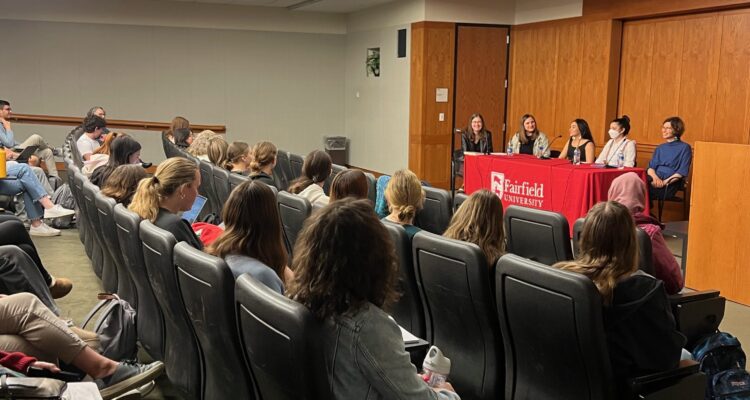Idra Novey, Ph.D, author of “Take What You Need,” joined more than 40 faculty, staff and students for a “Conversation in the Arts” event hosted in the Library Multimedia Room on March 12. Novey’s panel was the Arts Institute’s inaugural event and marks the beginning of a rich partnership between the DiMenna-Nyselius Library and other departments on campus as it aims to collaborate and host enriching events.
In addition to Novey, the panel consisted of Gabrielle Jacob ‘24, Carilyn Rivera ‘24, Assistant Professor of Spanish Linguistics and Translation Studies Laura Gasca Jiménez, Ph.D. and Professor and Chair of Visual & Performing Arts Department Marice Rose, Ph.D.
The Department of Modern Languages and Literature “chose to host Idra Novey because it was an opportunity for students to become familiar with the work of an accomplished professional literary translator,” explains Gasca Jiménez. She continues, “the main purpose of the event was to highlight the many interdisciplinary connections that we often find in the humanities and the arts.”
Student panelists, Rivera and Jacob both felt honored to have been asked to be a part of the event and reflected upon the opportunity.
“Dr. Marice Rose reached out to me with the opportunity to be a part of the panel because of the overlapping themes covered in both Novey’s work and my artwork such as immigration, the pursuit of knowledge and beauty found in unlikely places,” states Rivera.
Similarly, Jacob was chosen for the panel because of her research as a Humanities Student Fellow. “Dr. Rose and the other professors involved in orchestrating this event thought that my perspectives during the HI seminar were insightful and that my own student research project would complement the themes of Ms. Novey’s novel quite well since they both focus on elements of underrepresentation, belonging and identities,” she reflected.
Novey is not only an author, a poet and a professor of creative writing at Princeton University, but she is also a translator as well.
The event began with questions from the panelists, which often referenced Novey’s multilingual identity, asking her about her writing process and how it is impacted by her identity as a multilingual author.
Novey explains that she finds writing or belonging to one culture impossible: “Your nature fights doing it,” she stated. To demonstrate how she experiences cultural dissonance, she offered an example from her novel.
She references the first line of her novel, which begins with a phrase about “quieting the mind,” a phrase not primarily used in English. “Even though the lines are in English, I imagined the family speaking in Spanish,” she explains, which is how the phrase “quieting the mind” opens her novel, as the English translation originates from the Spanish phrase “callar la mente,” which is more commonly used.
After learning about the writing process for multilingual writers, students in attendance note the power of being multilingual and its manifestations not only in writing professions but in other fields as well.
Spanish minor Jenna LaRochelle ‘25 touches upon Novey’s multilingual identity. “It was interesting to hear how translation and being multilingual helped Idra create scenes and characters representative of all types of people.”
Then, LaRochelle connects Novey’s conversation with her personal life. “As I work in healthcare, knowing Spanish and being able to translate helps me make patients feel seen and heard,” she states.
Fellow Spanish minor Erin Resnick ‘25 believes in the value of learning Spanish “because it gives [her] the opportunity to communicate with more people and understand other perspectives on the world, especially because I’m going into the Education field.”
Resnick continues to make connections between Novey’s conversation and the benefits of translation.“ Learning how to translate can help others have equal opportunities and make people feel more comfortable and confident,” she believes.
During her conversation, Novey stressed the importance and value of studying the humanities. “My students go on to inhabit many professions and have wide career choices,” she maintains that “studies show that humanity majors succeed in many occupations.”
She adds that one of the most important lessons she can teach her students is to “take a risk or take a seat. You have to continually ask yourself, what is the risk I am taking and why is it meaningful.”
Gasca Jiménez echoes Novey’s discussion of the importance of exploration and risk-taking in the context of the humanities and the arts. “I hope students left the panel energized to continue exploring what the humanities and the arts have to offer them professionally and personally,” she stated.
Like Gasca Jiménez, Novey also knows students don’t only need the humanities for job opportunities or risk-taking, but for personal gain, as she believes “you need the humanities to seek joy throughout your life.”


Leave a Reply